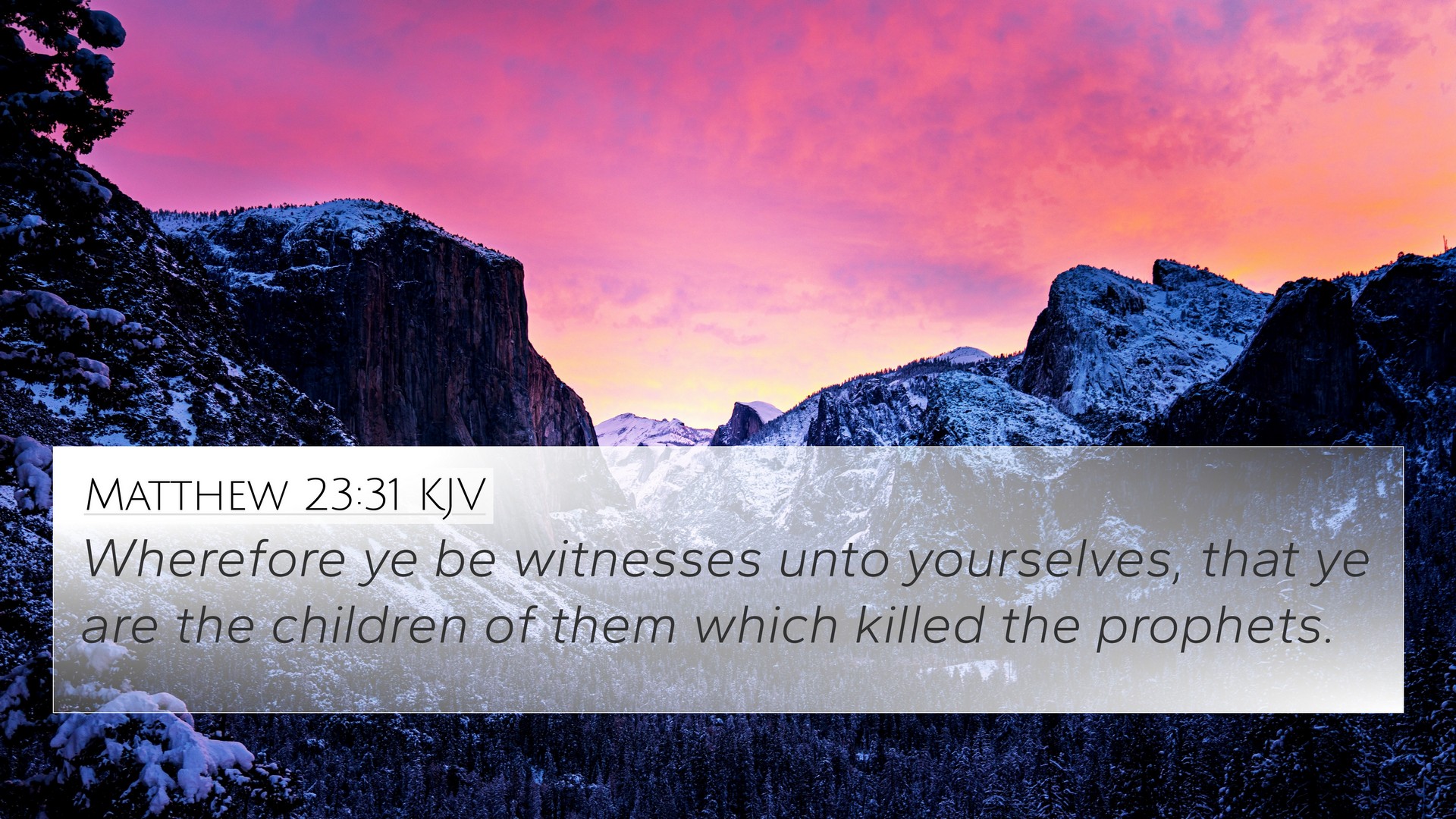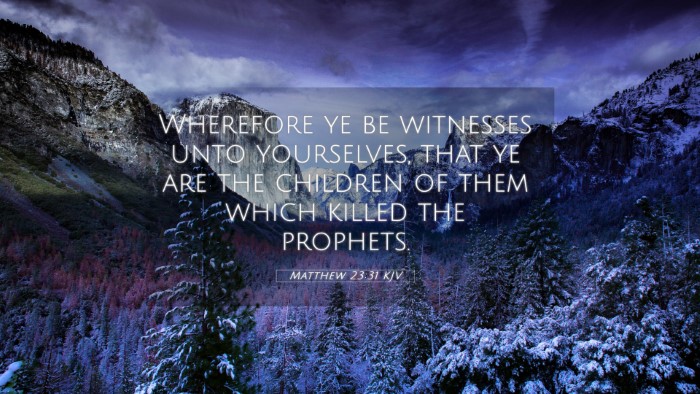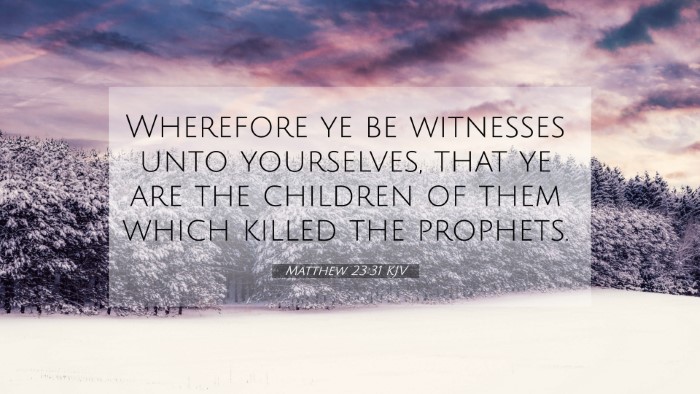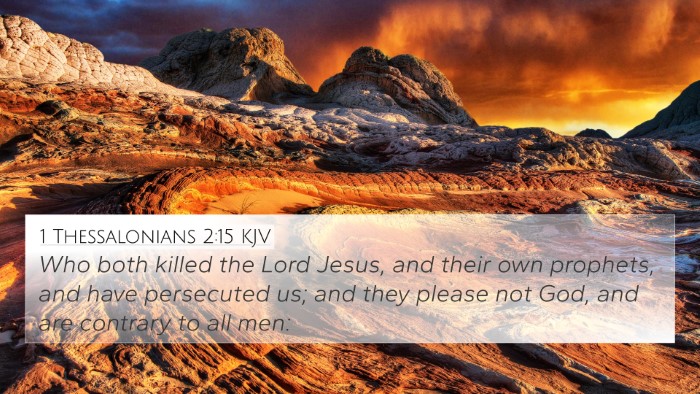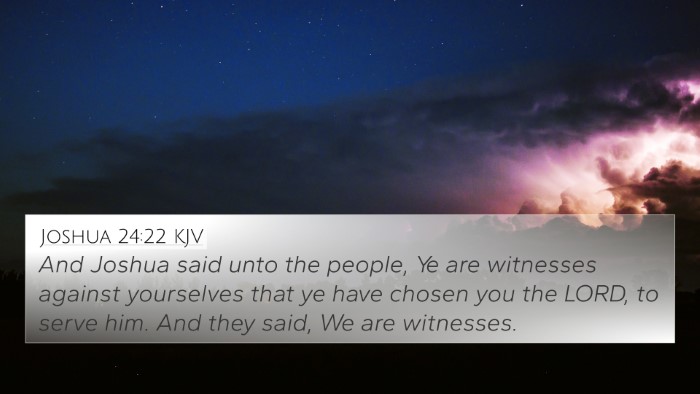Understanding Matthew 23:31
Verse Context: Matthew 23:31 states, "Therefore you are witnesses against yourselves that you are sons of those who killed the prophets." This verse is part of a larger discourse where Jesus confronts the religious leaders of His time, highlighting their hypocrisy and moral failure.
Meaning and Interpretation
The essence of this verse lies in the indictment of the religious leaders who profess to be followers of the prophets while embodying the same hostility towards God's true messengers. Their actions contradict their claims and reveal a lineage of rebellion against divine authority.
Commentary Insights
- Matthew Henry: Henry emphasizes the notion of self-incrimination among the religious leaders. He suggests that their acknowledgment of being the descendants of those who persecuted prophets highlights their moral blindness and failure to heed the lessons of the past.
- Albert Barnes: Barnes discusses the historical context, illustrating how the present generation stands guilty of the same crimes committed by their ancestors. He stresses that the rejection of prophets is a recurring theme, and the leaders have inherited the guilt of their forebears.
- Adam Clarke: Clarke notes the gravity of Jesus' words, showing that the leaders' actions reveal more than mere disobedience; they signify a complete misunderstanding of their identity as God's chosen people. Clarke points out that their rejection of Christ culminates a long history of rebellion against God.
Bible Cross-References
To fully appreciate Matthew 23:31, it is helpful to examine related scriptures that emphasize its themes of accountability and prophetic rejection. Below are several Biblical passages that create connections with Matthew 23:31:
- Luke 11:47-51: Here, Jesus rebukes the Pharisees for building tombs for the prophets while their ancestors killed them, paralleling the themes in Matthew 23:31.
- Acts 7:52: In Stephen's sermon, he accuses the Jewish leaders of perpetuating the cycle of resisting the prophets, which echoes Christ's concern for prophetic legacy.
- Matthew 5:12: This verse encourages rejoicing when persecuted for righteousness, contrasting with the leaders’ actions that led to the persecution of God’s prophets.
- Hebrews 11:36-38: This passage refers to the suffering of prophets who testified to God’s truth, illustrating the historical enmity faced by messengers of God.
- Jeremiah 26:20-23: A historical account of the prophet Uriah, who was killed for his message, representing the continuation of rejection that Matthew 23:31 condemns.
- Matthew 23:32: The continuation of this chapter where Jesus accuses the leaders of completing their forefathers' wickedness reinforces the message of accountability and legacy.
- 1 Thessalonians 2:15-16: This passage addresses the Jewish leaders’ hostility towards prophets and apostles, drawing a clear parallel to the accusations Jesus makes.
Cross-Referencing Biblical Texts for Deeper Understanding
Engaging in a comparative Bible verse analysis helps in understanding the thematic connections across the scriptures. Utilizing tools such as a Bible concordance, one can explore how different passages reflect the ideas present in Matthew 23:31.
Thematic Connections
The themes of prophetic rejection and the inheritance of guilt resonate throughout the Bible. Identifying these connections not only enriches one's understanding of the text but also promotes an insightful Bible cross-reference study. Key themes include:
- Rejection of Prophetic Voices: The consistent pattern of rejecting God's messengers throughout biblical history.
- Inter-Generational Accountability: How the offenses of one generation can create a legacy of guilt and judgment.
- Call to Repentance: Each warning serves as an invitation to reflect on personal accountability and the call for reform within religious structures.
Conclusion
Matthew 23:31 serves as a poignant challenge to examine one's faith and actions concerning God's word and messengers. By utilizing cross-references and exploring the connections between different Bible verses, one can uncover a deeper, more cohesive understanding of the Scriptures and God’s continual call for righteousness and accountability.
How to Use Bible Cross-References: For those interested in exploring cross-references further, engaging with a comprehensive Bible cross-reference guide can illuminate links between verses. This practice aids in drawing parallels, enriching one’s personal study and understanding of themes found throughout both the Old and New Testaments.
